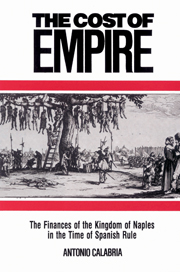Book contents
- Frontmatter
- Contents
- List of figures
- Acknowledgments
- List of abbreviations
- Weights and measures
- Monetary units and exchange rates
- Maps
- Introduction
- 1 The early modern Southern Italian economy
- 2 The fiscal system in early modern Naples
- 3 Government income, 1550–1638
- 4 Government expense, 1550–1638
- 5 The creation of a securities market in the later sixteenth century
- Conclusion
- Appendix I The tables
- Appendix II The sources
- Bibliography
- Index
- Cambridge Studies in Early Modern History
- Frontmatter
- Contents
- List of figures
- Acknowledgments
- List of abbreviations
- Weights and measures
- Monetary units and exchange rates
- Maps
- Introduction
- 1 The early modern Southern Italian economy
- 2 The fiscal system in early modern Naples
- 3 Government income, 1550–1638
- 4 Government expense, 1550–1638
- 5 The creation of a securities market in the later sixteenth century
- Conclusion
- Appendix I The tables
- Appendix II The sources
- Bibliography
- Index
- Cambridge Studies in Early Modern History
Summary
In the fifteenth century, the winds of change that were transforming kingdoms and principalities in Western Europe swept also over the Kingdom of Naples. Under the leadership of King Alfonso the Great, the Aragonese dynasty wrested control of the Kingdom from the Angevins in 1442 and embarked on a remarkable course of state-building that strengthened and renewed the power of the Monarchy. The Aragonese rulers succeeded in abating the force of an adventurous and unruly nobility and in refurbishing the Kingdom's institutions. Like many states in the North, Naples thus acquired the rudiments of a state army, a viable fiscal organization and a relatively effective bureaucracy. The royal reforms served also to stimulate productive activities, not least because of the social truce they assured. Partly as a consequence, the Kingdom came to witness economic expansion and demographic growth. Its capital, the city of Naples, was rapidly transformed into a full-scale administrative center; it came to serve as well as a magnet for growing numbers of immigrants from areas nearby and far afield alike. Overly rapid growth, to be sure, brought its own problems, but the tears in the fabric of the Kingdom, heritage of the preceding turbulent century, mended, and by the later fifteenth century Naples was one of the most important and populous members of the Renaissance state system.
A century and a half later, that process of construction, and reconstruction, had run its course. A new, difficult chapter had begun for the Kingdom; “crisis” and “decline” were to be important themes in it.
- Type
- Chapter
- Information
- The Cost of EmpireThe Finances of the Kingdom of Naples in the Time of Spanish Rule, pp. 1 - 8Publisher: Cambridge University PressPrint publication year: 1991



